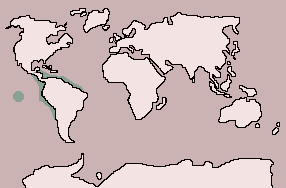Magnificent Frigatebird

| Class: Aves: Birds |
Diet: Fish |
| Order:
Pelecaniformes: Seabirds |
| Size:
95 - 110 cm (37 - 43 in), wingspan: 215 - 245 cm (85 - 96 in) |
| Family: Fregatidae:
Frigatebirds |
Conservation Status:
Non-threatened |
| Scientific Name: Fregata
magnificens |
Habitat: coastal
waters, islands, bays, estuaries |
| Range:
Central America; South America; Galapagos Islands |
 The
male magnificent frigatebird has a particularly large and splendid throat
pouch, and the species has the greatest wing area, relative to body size,
of any bird. It feeds chiefly on fish, squid, crustaceans and jellyfish,
which it catches by swooping down to the water surface. It rarely alights
on the sea. Frigatebirds supplement their diet by stealing fish from other
birds. Having spotted a booby or other seabird returning to land, the frigate
gives chase and forces its quarry to regurgitate its catch, which it then
grabs in midair. The nest of the magnificent frigate-bird is a flimsy
construction of sticks. The female lays a single egg, which both parents
incubate. Both feed and care for the chick for a total of about 7 weeks.
Both parents bring the chick food until it is able to fly at 4 or 5 months
old and continue feeding it intermittently for some weeks more. The
male magnificent frigatebird has a particularly large and splendid throat
pouch, and the species has the greatest wing area, relative to body size,
of any bird. It feeds chiefly on fish, squid, crustaceans and jellyfish,
which it catches by swooping down to the water surface. It rarely alights
on the sea. Frigatebirds supplement their diet by stealing fish from other
birds. Having spotted a booby or other seabird returning to land, the frigate
gives chase and forces its quarry to regurgitate its catch, which it then
grabs in midair. The nest of the magnificent frigate-bird is a flimsy
construction of sticks. The female lays a single egg, which both parents
incubate. Both feed and care for the chick for a total of about 7 weeks.
Both parents bring the chick food until it is able to fly at 4 or 5 months
old and continue feeding it intermittently for some weeks more.

  
|
